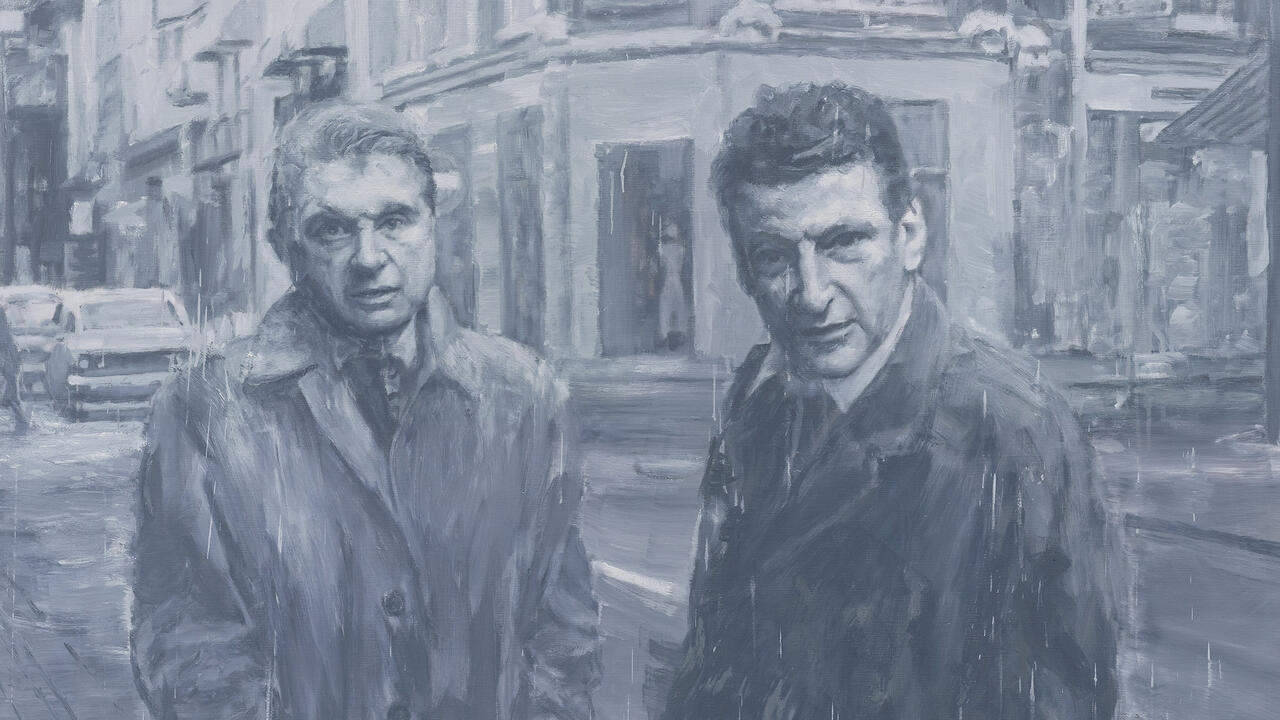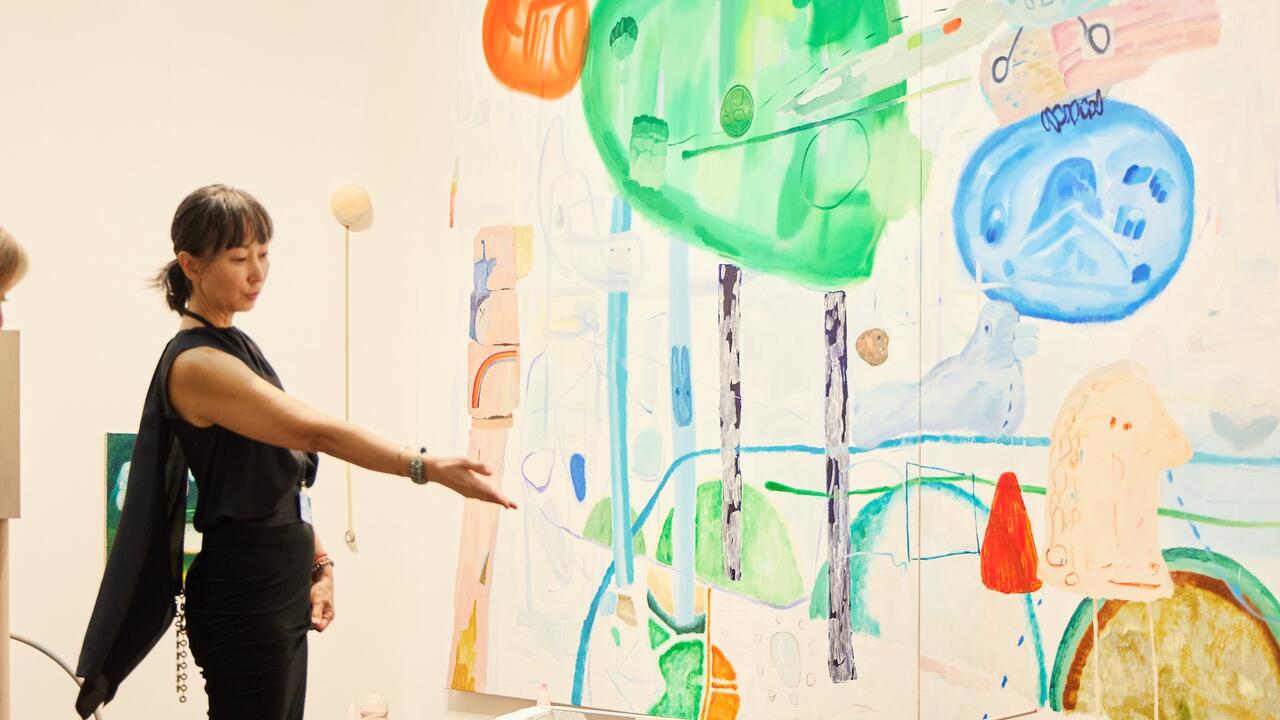Ich Bereue Keine Stunde
Christian Flamm
Christian Flamm
At a certain point in your life, you might lose the ability to live in the here and now. You become dissociated from the world outside, and nothing can bridge the gap. You doubt that anyone can ever be what they purport to be. You are not alone.
Other people live second-hand lives trying to approximate received images of what their life should look like. The images are all you get; there must be a way of relating to them. But how can you believe in handed down images of love, work, friendship, personal fulfilment or political revolution, if all you have to go on in the first place is your wish to believe?
Christian Flamm explores his paradoxical personal relationship with such collective ima-gery. On his computer he designs, reproduces, and alters pictures that are charged with emotion and promise. Computer drawings are converted into cut-outs of coloured cardboard, and their graphic appeal heightens the iconic quality of the images. Their suggestive openness provokes the spectator to project their wishes, fantasies, and memories onto them. New possibilities of relating to the images might present themselves - or they might remain opaque surfaces.
In his most recent installation Wir müssen miteinander reden (We Have to Talk, 2000) at Galerie Neu in Berlin, Flamm presented a sequence of cut-outs in grey, black, and white: a geometric composition reminiscent of a puzzle; a crouching girl reading a book; a boy cowering with his arms raised in self-defence; a graph of share prices; a father holding an umbrella to protect his wife and children who huddle next to him; a blank white panel; two lovebirds on a perch; and a police van with a grated windscreen. On the floor were laid coloured computer print outs shaped like rugs. The words 'wir müssen miteinander reden' were applied in handwriting on the gallery window. An art magazine from 1970 was on display, featuring a yellowing portrait of the Salon de la jeune Peinture, a circle of politically engaged artists.
Flamm constructs polar opposites: the wish for happiness against a fear of state power intruding into the personal sphere - the promise of intimacy versus the threat of the police. He sketches out the utopian concept of private space as a bastion against the state, and the place where love, comfort, and intellectual freedom reside. But, due to the clichéd nature of the images, he also encourages doubts: what could be more ideologically suspect than the ideal of the nuclear family, or the stereotype of alternative culture comprising pointless, dope-fuelled discussions taking place on rancid rugs? The prospect of a happy life in seclusion seems unreal. So does the menace of state power. Yet we know that this power can become real at any time. Maybe we should also reconsider the promise of alternative lifestyles.
Flamm further explored the antagonisms of political imagery in his installation Umsonst ist das Leben (Life Is Free, 1999) at the Frankfurter Kunstverein. Frankfurt is a city of extreme contrasts: towering office blocks proclaiming the glory of Capitalism sit cheek by jowl with small antiquarian bookshops whose ageing leftist proprietors guard the inheritance of critical theory. For this work, Flamm produced a vast bookshelf, cutting the silhouettes of the individual books out of coloured cardboard. The image of an indoor plant was displayed as a free standing prop, and four boards leaned casually against a wall. One was blank (but covered with dust so that every touch left a mark), while the other three comprised black on white stencil drawings: a dove of peace; a broker studying a graph of stock prices; and a girl with a Beatles haircut and a provocative look on her face. She radiates the sexiness of political activism but the intention of these images is left in limbo: is the mythical vitality of the 1960s' protest movement lost in the stagnation of greying hippies, their dusty bookshelves, and straggly pot plants? Or should we reactivate the Romantic imagery of direct political resistance?
Ich bereue keine Stunde (I Don't Regret a Single Hour, 2000) is a series of nine images intended to be shown one at a time on a black wall. They are elements of a possible biography presented in the form of stylised motifs: a scene of education, the drama of love, longing and remorse; an intimate conversation among friends; and an image of a workplace and a potential client. Those images not on display lean against an adjacent wall in a stack - you can sift through them as you might a pile of records.
If you do so, you will discover a story tinged with melancholy. But whose story is it anyway? These images belong to no one. On one panel, a fey boy gazes out of a window while a girl watches him from across the room - but he could have been picked off the sleeve of a Smiths' album. A plain, dark blue panel containing two silver palm trees and the barely discernible word 'Canossa' collaged next to them, has an air of wistful escape, but it could equally well be the logo of a cheap 1980s cocktail bar. Even the boy who throws back his head in a melodramatic gesture of despair may simply be striking a pose. Despite their ambiguity, why do we still connect with these images?
Perhaps it is their openness - they offer themselves up in a distinctively non-ideological way. The ideological image will always try to close the breach that separates the alienated self from the world, and feign the possibility of successful identification with it (now you, too, can be fitter, happier, and more productive!). Flamm, however, acknowledges that this is an impossibility. He concedes that the history of the image will always conspire against you, and the original experiences surrounding the myth of Pop icons can never be recovered. Who can tell what 1968 or 1976 really felt like?
Flamm suspends his images at a peculiar remove. They seem at once familiar and remote; they are accessible, but their elegant surfaces withhold their secrets. Consequently, they encourage you to be dysfunctional. If you don't know how to approach these icons that reflect your dreams and aspirations, that's alright. Insecurity is okay. Dysfunctionality is a gift.

















